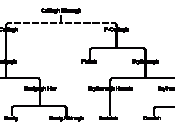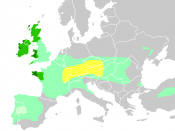Running Head: INDO-EUROPEAN AND THE CELTIC LANGUAUGE 1
Indo-European and the Celtic language
Tari Pifer
AIU Online
Abstract
The purpose of this paper is to discuss how the vernacular Celtic language was a strong language in the Britain and Iberian-Peninsula and the later disappeared with the Roman Empire invasion and then infiltrated the use of the Latin language from the Roman presence.
Indo-European and The Celtic Language
During the Hellenistic time the Celtic language came from a span across Europe to Asia Miner in the east where to this day in Galatia present speaking Gaul's people recall a Celtic speech origination.
Roman Triumph
Later after the Roman military took over the language then transformed into Latin by the 5th Century and native Celtic language had disappeared from the continental Europe. To date the Celtic languages are limited mostly to the British Isles and French Brittany where approximately 2 million people speak the Celtic tongue today.
The Origin of Celtic
The Celtic has three groups of people to form the language, which include the Continental, British and Gaelic people. Celtic language and it's definitions were a complicated language to understand due to the spelling not corresponding to the pronunciation and it's initial consonants will change depending on the final sound of the proceeding word. If one were to look up a word in the Celtic language they would need to be familiar with their changing of the phonics or atlering of the language.
Continental Celtic
The first group is the Continental Celtics, including all Celtic phrasing on the Continent except Breton, people disappeared with the fall of the Western Roman Empire in the late 5th century this group language was Gaulish but now are extinct. Gaulish once known of Gaul proper which today is France. Personal and proper names...


